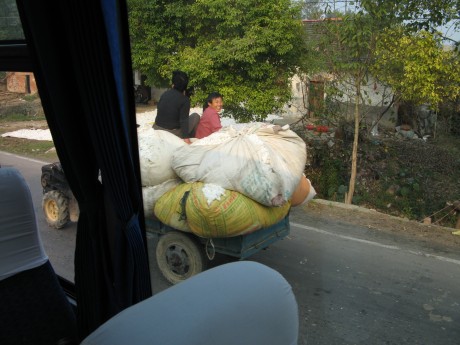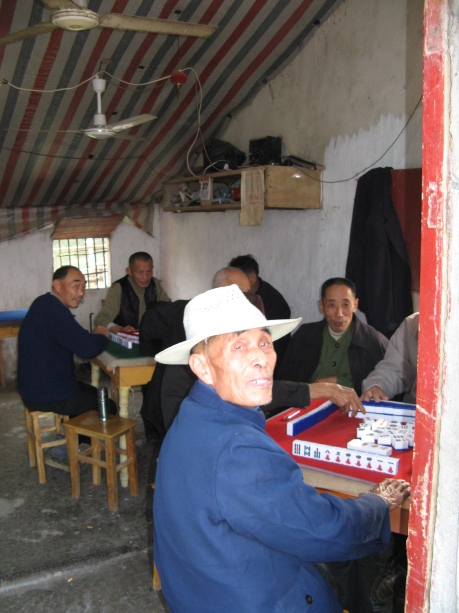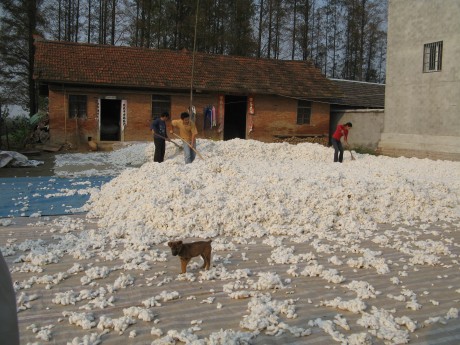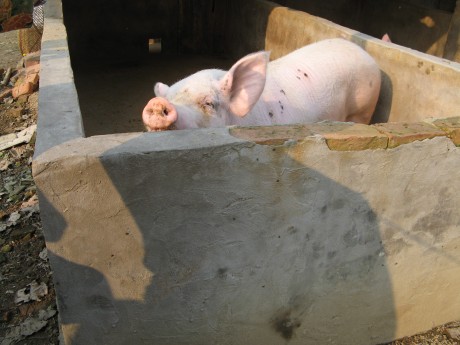I’m glancing back in time (before I became a blogger) to review my China trip in 2006, if you are new to this blog. We are lucky to have a very frank, honest guide in Vicki Zhuang (chung). I forgot to mention in yesterday’s blog that before we left the ship, she warned us that the envelopes left in our room for the “non mandatory” tip should not be used. Instead she gave us all the envelopes we wanted and instructed us to deliver the tips directly to the workers we want to reward, or not, as we see fit. She explained that the well paid managers take a percentage of the tip money for themselves and the workers get the rest. When Michal and I directly tipped our table workers, one of them broke down and cried, he was so unbelieving and grateful. So, folks, when you buy Chinese goods, remember how exploited the workers in this country are. And, if you go with a tour group, remember to tip directly.

We are traveling across Szechuan Province. From the bus we spot this fancy car with a wedding party.

Followed by the rest of the revelers in an open vehicle like a bus with a roof. City people are more affluent but Vicki tells us this is a poor province and reminds us that it is from this province that spicy Chinese food originated.

We see vast farmlands, rice paddies, people working the fields with water buffalo wearing the typical straw Chinese sun hat and black pajama like pants or more modern blue jeans. We see goats, chickens, dogs, geese and sometimes a single tethered cow. Clusters of villages with wooden or cement buildings, and a few motorized tractors fly by. Vicki tells us that at one time this area of China supplied all of their food. Among our group, we talk about our visit to a city family in the Hutongs and wonder what it would be like to visit an unpaid family? I’m elected to ask. Much to our surprise, she instructs the driver to pull over in the next village we come to.

You can see the bus parked on the road in the background. Vicki stops at this building on the right which is like the community center for this village, and asks if it would be all right for us to visit a local family. The building contains a small store, a barbershop and a meeting room.

We tried not to be too intrusive. I got a quick shot of a man getting his haircut.

I nee-howed and waved at the men in the meeting room playing majong.

The houses on the street looked like this, close together, mostly one story. Their front yards are food gardens. We noticed spinach, chard, radishes, beans, cucumbers, cabbages, peppers and pumpkins.

However, the main crop of this area is cotton that we could see being raked on cement slabs in front of every house. Michal and I chose a small house next to this building and Vicki went to talk with the owner. She consented to let we “big noses” visit her house.

She keeps a pig in her front yard which was in a very clean pen with no major odor. The pig is fed a fast growing water weed grown on a pond adjacent to the community building.

The rooms were very small and dark. The only picture I could take was out the back door where her storage room full of bagged cotton was stacked. One bed took up the whole of one room from wall to wall. She cooks on a huge wok about two feet in circumference that sits on a cement column where you can see a gas fired burner. Implements hang from the wall.

Her house was neat and clean though she kept apologizing about how unkempt her house was, Vicki told us.

She allowed herself to be photographed with Michal and I. She has two grown sons, both have graduated from university. One son works on the Three Gorges Dam building a silt collector. The other is an architect and works in Beijing. It occurred to me that nowhere in the United States would a tourist bus pull up to your house and even remotely expect anyone to allow a busload of people to tromp through your house. We tried to pay her and she refused the money, but Vicki insisted she take it.

As we walked back to the bus, I wanted to stop and take a peek into the store. This handsome gentleman was just coming out and I asked him, (indicated) I’d like to take his picture. Then I showed him his picture on the digital screen. The fellow on the right, watching, quickly took my picture with his cell phone and showed it to me. I felt like such an idiot. At that time I didn’t even own a cell phone.

We are traveling across Szechuan Province. From the bus we spot this fancy car with a wedding party.

Followed by the rest of the revelers in an open vehicle like a bus with a roof. City people are more affluent but Vicki tells us this is a poor province and reminds us that it is from this province that spicy Chinese food originated.

We see vast farmlands, rice paddies, people working the fields with water buffalo wearing the typical straw Chinese sun hat and black pajama like pants or more modern blue jeans. We see goats, chickens, dogs, geese and sometimes a single tethered cow. Clusters of villages with wooden or cement buildings, and a few motorized tractors fly by. Vicki tells us that at one time this area of China supplied all of their food. Among our group, we talk about our visit to a city family in the Hutongs and wonder what it would be like to visit an unpaid family? I’m elected to ask. Much to our surprise, she instructs the driver to pull over in the next village we come to.

You can see the bus parked on the road in the background. Vicki stops at this building on the right which is like the community center for this village, and asks if it would be all right for us to visit a local family. The building contains a small store, a barbershop and a meeting room.

We tried not to be too intrusive. I got a quick shot of a man getting his haircut.

I nee-howed and waved at the men in the meeting room playing majong.

The houses on the street looked like this, close together, mostly one story. Their front yards are food gardens. We noticed spinach, chard, radishes, beans, cucumbers, cabbages, peppers and pumpkins.

However, the main crop of this area is cotton that we could see being raked on cement slabs in front of every house. Michal and I chose a small house next to this building and Vicki went to talk with the owner. She consented to let we “big noses” visit her house.

She keeps a pig in her front yard which was in a very clean pen with no major odor. The pig is fed a fast growing water weed grown on a pond adjacent to the community building.

The rooms were very small and dark. The only picture I could take was out the back door where her storage room full of bagged cotton was stacked. One bed took up the whole of one room from wall to wall. She cooks on a huge wok about two feet in circumference that sits on a cement column where you can see a gas fired burner. Implements hang from the wall.

Her house was neat and clean though she kept apologizing about how unkempt her house was, Vicki told us.

She allowed herself to be photographed with Michal and I. She has two grown sons, both have graduated from university. One son works on the Three Gorges Dam building a silt collector. The other is an architect and works in Beijing. It occurred to me that nowhere in the United States would a tourist bus pull up to your house and even remotely expect anyone to allow a busload of people to tromp through your house. We tried to pay her and she refused the money, but Vicki insisted she take it.

As we walked back to the bus, I wanted to stop and take a peek into the store. This handsome gentleman was just coming out and I asked him, (indicated) I’d like to take his picture. Then I showed him his picture on the digital screen. The fellow on the right, watching, quickly took my picture with his cell phone and showed it to me. I felt like such an idiot. At that time I didn’t even own a cell phone.
No comments:
Post a Comment